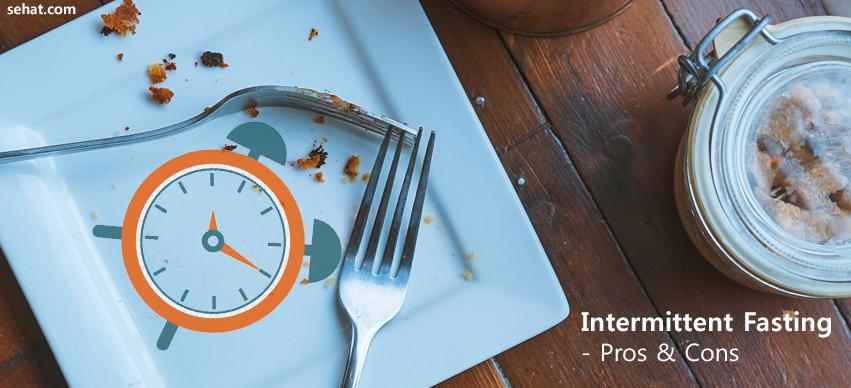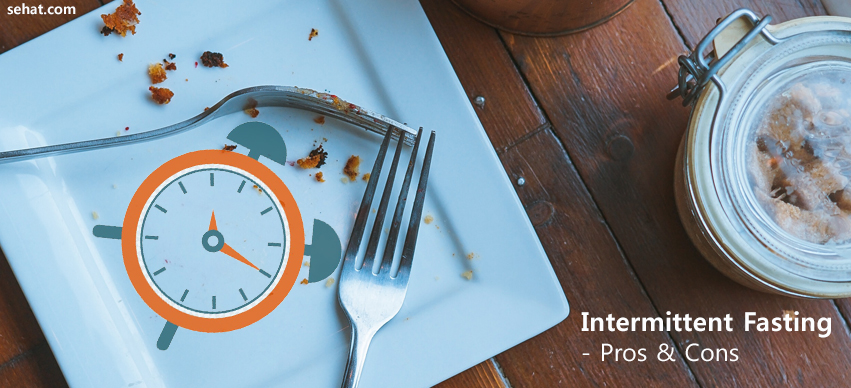
Obesity has become increasingly prevalent in both developed and developing nations due to factors such as a sedentary lifestyle, lack of physical activity, and ease of access to fast foods. Obesity is a major risk factor for the development of various illnesses such as metabolic and hormonal disorders, arthritis, hypertension, coronary artery diseases, diabetes mellitus, and respiratory illnesses.
Likewise, there has been an alarming increase in awareness among the general population regarding weight loss as a means to maintain a healthy lifestyle. While some people choose to undertake exercising, some opt for dieting and keeping a strict tab on what they eat, the portion of the food that they eat, and the timing of their meals. This article will give you an overview of what is intermittent fasting and intermittent fasting pros and cons.
[Also Read: Side Effects Of Low Carb Diet]
What Is Intermittent Fasting?
Intermittent fasting is specifically an eating pattern consisting of periods of fasting. It includes eating patterns with extended periods (16- 48 hours) of little or no-energy foods with intervening periods of eating as much as required or necessary. Intermittent fasting involves 60-100% energy restriction on fasting days with the desired energy intake on fed days. Various intermittent fasting regimes have been introduced, however, the most popular one is alternate-day fasting and a regime of fasting for two days per week. The following are intermittent fasting pros and cons.
Intermittent Fasting Pros
The benefits of intermittent fasting on human health have been clinically verified through various studies. The following are some significant intermittent fasting pros;
- The decrease in total visceral fat, that is, the fat surrounding abdominal organs such as the liver and intestines.
- Marked reduction in fasting levels of insulin.
- Significant improvement in lipids and total cholesterol levels in the blood.
- Improvement or reduction in inflammatory markers such as C-reactive protein (CRP), tumor necrosis factor (TNF), leptin, adiponectin, and brain-derived neurotrophic factor.
- A controlled weight-loss clinical trial found that a modified fasting regime combined with an exercise protocol produced significant weight loss results as compared to fasting or exercise alone.
- Intermittent fasting regimen showed a 3-8% reduction in total body weight after 3-24 weeks in contrast to only energy restriction.
- Intermittent fasting improves the metabolic functions of the body by regulating
- Circadian (sleep) cycle
- The gut flora (healthy bacteria of the intestines)
- Modifiable lifestyle behaviors
- Improves hunger and promotes mindful eating and appreciation of whole foods
- Promotes cellular regeneration and repair
- Normalizes blood pressure
- Provides rest to our digestive organs
Intermittent Fasting Cons
Each concept has its own pros as well as cons. This holds true even for intermittent fasting. The following are some documented intermittent fasting cons;
- The drop-out rate is quite high as compared to other weight loss regimes.
- Intermittent fasting may affect a person’s social life as a person may be fasting on the particular social outing or event.
- Intermittent fasting can affect job performance, especially in beginners. On fasting days, people often tend to think about food which diverts their mind from work.
- It can make you feel fatigued, sick, or dizzy especially if you work out in the morning. Also, if you are habituated to having a heavy breakfast, you find it difficult to control the hunger when you begin intermittent fasting.
- A study conducted over a time period of one year found that cholesterol increased significantly after 12 months among the fasting group. This also raises a question on the effect of intermittent fasting upon cardiovascular health.
- In several cases, it was found that on “fed†days, people tend to binge on a lot of junk food like pizzas, desserts, French fries, and a lot of processed foods which are of extremely low nutritional value. Also, there is a strong biological tendency to overeat after periods of fasting.
- There are commercially available packages for intermittent fasting, but these are relatively expensive for people.
- Intermittent fasting cannot be practiced by women who are pregnant or lactating.
- Intermittent fasting cannot be practiced carefully by patients with diabetes mellitus or hypertension as these people are very likely to develop electrolyte abnormalities.
- People with eating disorders or those who require regular meals for medications cannot practice intermittent fasting.
A major intermittent fasting con to keep in mind that it is not meant for every person. On one hand, it is contraindicated in certain patient groups; while on the other hand, persons who practice intermittent fasting may or may not achieve desirable results.
Results of intermittent fasting depend largely upon its suitability to various persons. Therefore, each person may face a different set of intermittent fasting pros and cons.
Although intermittent fasting has proven results on its wide range of health benefits, solid supportive research is scarce and the majority of the research conducted to date is carried out on animal models and not on humans.
Additional Points To Keep in Mind If You Plan To Begin Intermittent Fasting
- Consult your doctor first, especially if you are on treatment or medications for some disorder
- You will not lose out on muscle mass if you exercise regularly
- A low carbohydrate high-fat diet (LCHF) goes well with intermittent fasting. You can consult a dietician for the same to achieve better results
- You can exercise while fasting, but only under the supervision
- Drink plenty of water and non-caloric beverages when fasting.
- You don’t need to completely cut down on tea and coffee
- Do not use intermittent fasting as an excuse to eat junk food during the “fed†days
Weight loss aids in maintaining the overall health of the patients while maintaining optimum levels of parameters such as blood pressure, blood sugar levels, insulin, serum cholesterol, and inflammatory markers in the blood.
Time and again, studies have proven that lifestyle modification is the most effective method to achieve weight loss and reduce risks for cardiovascular diseases.
There are several weight loss regimes like diets and exercise modules readily available for weight loss. Yet, one of the least recognized dietary modification is intermittent fasting.

